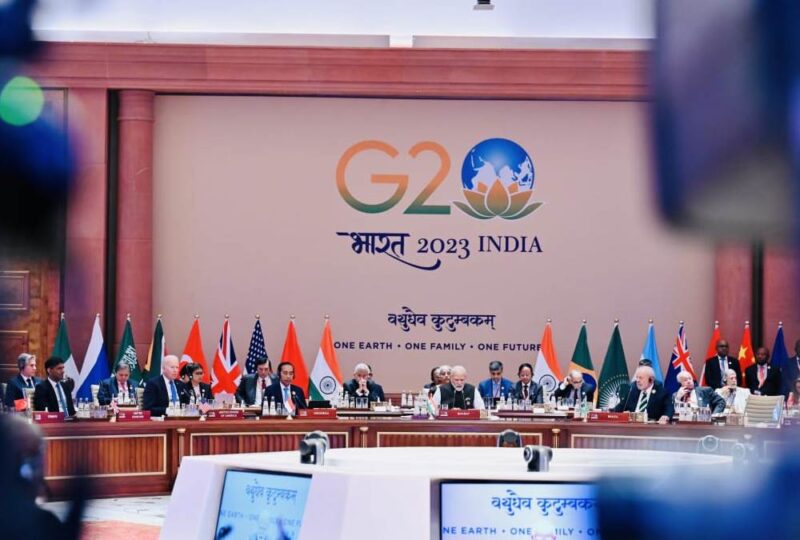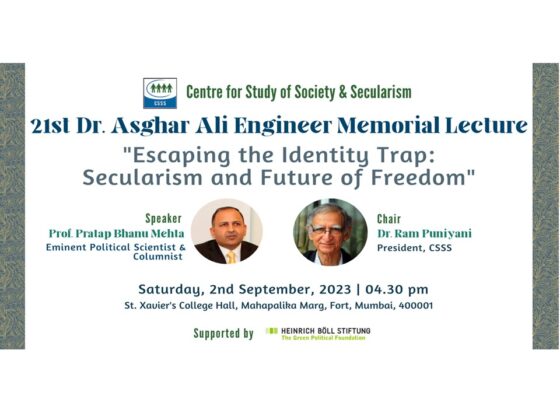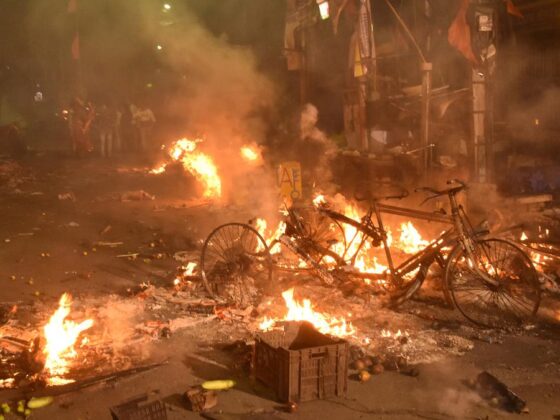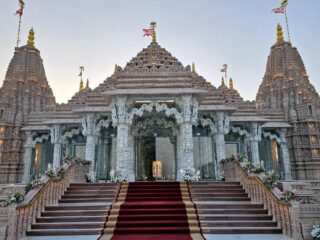Neha Dabhade
The recently concluded G20 Summit brought together world leaders who reiterated their dedication to inclusive growth, sustainable development goals (SDGs), climate action, gender equality, and the creation of a more inclusive world. India played a significant role in this summit as its host nation. This accomplishment not only bolstered India’s global standing but also potentially enhanced PM Modi’s image as he approaches general elections within a year. India’s prominence at the G20 Summit signifies a position of influence and responsibility, both on the global stage and within the country. It is commendable that world leaders are collectively shaping a vision imbued with lofty ideals and goals, with India at the forefront of this momentous endeavor. However, it is worth considering the paradoxical nature of India’s commitment to ideals such as freedom of religion or belief, freedom of expression, and the right to peaceful assembly on the world stage. This commitment appears hollow when juxtaposed with the ground reality in India. The country’s record on hate speeches, hate crimes, discrimination, Islamophobia, and anti-Christian violence raises questions about the sincerity of its international pledges.
While India takes center stage internationally due to the efforts put in by the bureaucracy and team of Indian government and PM Modi consolidates his domestic political position, it is an opportune moment to reflect on the stark dissonance between the lofty goals of forums like the G20 Summit and the prevailing policies and discourse within India. The Declaration of the G20 Summit stated, “We also emphasize that freedom of religion or belief, freedom of opinion or expression, the right to peaceful assembly, and the right to freedom of association are interdependent, inter-related and mutually reinforcing and stress the role that these rights can play in the fight against all forms of intolerance and discrimination based on religion or belief. In this regard, we strongly deplore all acts of religious hatred against persons, as well as those of a symbolic nature without prejudice to domestic legal frameworks, including against religious symbols and holy books”.
However, India is currently grappling with majoritarian politics, where discrimination and hatred based on religious identity are pervasive. The pursuit of a “Hindu Rashtra,” founded on exclusivity and the notion of superiority of Hindu religion over other religions, constitutes the core of the ruling party’s political agenda. Violations of freedom of religion manifest in various forms, including demolitions, mob lynching, the National Register of Citizens (NRC), and anti-conversion laws. Human rights defenders who raise their voices against these violations often find themselves behind bars or marginalized from mainstream society. Umar Khalid serves as a poignant example. Umar Khalid, student leader, is accused by the Delhi police of making several provocative speeches and appealed to people to come out to block the streets during the visit of former US President Donald Trump that according to the police amounted to incitement of Delhi riots in February 2020. He was booked under the anti-terror law Unlawful Activities Prevention Act (UAPA) and provisions of the Indian Penal Code (IPC) and languishing in jail for over three years without bail or trial. Across the country members of the civil society who have questioned government policies have ended with same fate. Thus, amid the accolades heaped upon India for the G20 Summit’s “success” and the expressed commitments, it is imperative to confront the uncomfortable truth.
Before dwelling into the stark reality that confronts us in India in regards to freedom of religion and religious and cultural diversity, let us understand what is UNGA Resolution A/RES/77/318 that the state of the summit seeks to uphold. Broadly, the resolution seeks to promote interreligious and intercultural dialogue and tolerance in countering hate speech and promote peace and freedom of religion. It enumerates different covenants and declarations to affirm its commitment to counter hatred, intolerance, discrimination, and hatred towards any religious group.
It might be paradoxical that India under the leadership of PM Modi pledged its commitment to countering hate speeches as PM Modi has maintained deafening silence over the most base and outrageous hate speeches that have often incited violence against marginalized religious groups. The speeches are aimed to dehumanize the minority communities and rendering them as second-class citizens and going to the lengths of calling for a genocide against them. Most of the hate speeches have proved to be precursor to anti- Muslim violence, as seen in Nuh recently. The hate speeches have become so virulent that the judiciary has been pulling up the regime to act upon perpetrators seriously. A disappointed SC has gone to the extent of calling the government impotent in controlling the hate speeches (Balaji, 2023). It is significant to point out that hate speeches are punishable under sections of Indian Penal Code including 295A and 153A. free speech is not absolute but governed by established laws. Hate speech go against law in India and other international covenants that India is signatory to. The government is duty bound to counter hate speech and rein in. Yet, the government has maintained silence over the most extreme of hate speeches including hate speeches calling for genocide against Muslims or Nupur Sharma’s objectional speech about Prophet Mohammad which attracted ire domestically and internationally and compelled Indian government to recognize it as a hate speech. However, little action is taken in the face of such grave hate speech and incitement emboldening more right-wing leaders to indulge in hate speech. The government has clearly not discharged its duty and its impunity has encouraged the culture of hate speeches in India.
Hate Speeches:
Here is a brief look at some of the hate speeches which is a window to view how marginalized communities are perceived and treated. Some of the speeches are delivered by elected representatives indicating their endorsement to the politics of hatred at the highest level. Assam Chief Minister Himanta Biswa Sarma held Muslims of Bengali origin referred to as pejoratively as ‘Miyas’ for high process of vegetables in Guwahati. He said, “People question me about vegetable prices. What is actually happening? Vegetables prices are low in villages. Here they (vendors from Muslim community) sell them at high rates.. Miya vendors here are charging high prices. But if we had Assamese vendors here, they wouldn’t have taken so much from our own (people). That’s why I will empty flyovers, I will empty all footpaths in Guwahati- let the Assamese people come out”. He also alleged that Muslims are introducing “fertilizer jihad” in India (Baruah, 2023).
Earlier, Sarma had also proclaimed that “there is no need for Madrasas in New India”. He went on to add that he wants to shut down Madrasas in addition to the 600 Madrasas he shut in Assam. Madrassa is centre where Islamic religious education is imparted along with other subjects. Under the Indian Constitution, communities have a right to impart religious education as under the International Covenant on Civil and Political Rights (article 18). To deny this right to a community is unconstitutional.
Recently, at a Panchayat at Delhi held by right wing organizations following communal riots in Nuh, Vishnu Gupta, Hindu Sena Chief, targeting the Muslims and insinuating that Muslims in India rightfully belong to Pakistan, in Nuh said, “The country was divided on religious basis. As long as we don’t get rid of them, the partition is incomplete”. There was a slew of hate speeches directed towards the Muslim community when the Hindu right-wing organizations insisted on organizing a series of rallies in the state of Maharashtra. Called the ‘Hindu Jangarjana Morcha’, the rallies were marked by vitriolic the speeches exhorting Hindus to take up arms against Muslims and also calling for economic boycott on Muslims. Suspended BJP MLA, T Raja Singh, during one such rallies had said, “it is time the Hindu community gets together and stands up against domination by a community. This is the anger in the hearts and minds of people, which is evident here today. Our sisters and daughters are falling prey to these systematic schemes by a community. In fact, I am urging every Hindu to boycott the purchase of any goods from shops run by members of the minority community”.
Kajal Hindustani, another leader of the right wing in one such rallies urged Hindus to boycott Muslim vendors, demolishing properties belonging to Muslims and not to rent out or sell flats to Muslims. She said, “In Navi Mumbai, land jihad has become so prevalent that today 25 Bangladeshi Muslims live in one room. They have hijacked our vegetable and fruit markets. I want you to repeat after me that – we, the people of Maharashtra, will economically boycott them. “We should not be renting or selling our spaces to them. If this is happening at societies in your vicinity, make an association with rules whereby whoever is not an idol worshipper should not be rented or sold a flat. (Bose, 2023)” Kalicharan Maharaj, one of the leaders of right wing said in Nanded said, “the Muslims who stay in the locality are from Pakistan. They are the ones who burst crackers after Pakistan wins a cricket match against India. Such hate speeches have incited violence in different places and rarely has any strict action been taken against those who have incited this violence.
Hate crimes:
The silence by the political leaders at any level and the patronage given by the state to right wing organizations has cascaded into ecosystem of impunity and blatant hate crimes. In an atmosphere where hatred is normalized and “othering” narratives are flying thick, hatred and hate crimes have become frighteningly common. The deep roots of this violence can be witnessed from the heart wrenching incident that was reported from Muzzaffarnagar in UP where a teacher, Tripta Tyagi urged her students in the classroom to slap seven years old Muslim student turn by turn. The boy was beaten because he made a mistake in the multiplication tables. Tyagi is heard saying on a video, “Maine toh declare kar diya, jitne bhi Mohammedan bachche hain, inke wahan chale jao” inciting violence against Muslims. In the most ruthless manner in the video Tyagi is seen exhorting the students to beat up their fellow student by saying, “Kya tum maar rahe ho? Zor se maaro na (why are you hitting him so lightly? Hit him hard) (Financial Express, 2023). The state has been silent on this incident except for inquiry into the school for not meeting mandatory facilities! No enquiry has been set up to investigate into this incident. Again, conspicuously missing was any condemnation of any BJP leader locally or nationally when a teacher is openly inciting violence against a seven years old child due based on his religion.
In another incident giving a glimpse into the cascading Islamophobia that is being injected in the Indian society, Railway Protection Force (RPF) Constable Chetansinh Chaudhary, 33, gunned down four persons on board the Jaipur-Mumbai Central Superfast Express on July 31, and threatened a burqa-clad woman passenger and forced her to say “Jai Mata Di” at gunpoint. The four persons who he shot at included his senior. The victims have been identified as Syed Saifuddin, Asgar Abbas Sheikh, and Abdul Kadar Mohamed Hussain Bhanpurawala. His senior was Tika Ram Meena. In a regime where mob lynching is common and perpetrators are rarely brought to justice, it appears that Chaudhary was arrested mostly for killing his seniors than killing those innocent passengers who were Muslims out of hatred. The police and the dominant narrative dismissed this incident by reducing the act of Chaudhary to mental illness and didn’t attribute it to systemic hatred against Muslims. There was no condemnation by the Prime Minister or any BJP leader.
Religious intolerance and discrimination are displayed evidently in the spate of demolitions that are undertaken over the last few years by the state under different pretext, especially that of encroachment. However, if studied carefully, it appears that most of these demolitions are targeted against Muslims, giving rise to the question that don’t other communities other than Muslims “encroach” of land? In a populous country like India with urban poverty and slums, people from all communities have built their shelters. But state action has been targeting one community. There are alleged lack of due process and arbitrary action by the state. On 9th and 14th August, the administration in Mathura, UP, undertook a demolition drive displacing over 500 residents, al Muslims. 137 houses were razed down to clear up alleged ‘encroachments’ near the temple complex and upgrade the 12 km railway track between Mathura and Vrindavan from metre gauge to broad gauge (Aswani, 2023). The livelihood of those displaced are destroyed along with their houses pushing them towards destitution. These demolitions come at the time of rains which left the homeless especially the children to shiver and watch ruefully their houses being razed down and the resulting rubble. Ironically, the drive took place just before the Independence Day of India but brought no freedom from hunger or homelessness for the residents of Nai Basti. Though eviction notices were served, the residents allege that the demolitions began before due process including hearing or discussion on rehabilitation. They believe that their houses were demolished because they were Muslims.
Allegations of Temples underneath Mosques:
While this declaration “deplores all acts of religious hatred against persons …. Including against religious symbols and holy books”, one can’t then ignore and feels compelled to think about the disturbing statistics as well as a rather ubiquitous trend of targeting mosques, dargahs and churches by right wing organizations. The right-wing organizations as well as some elected representatives from BJP have raised the rhetoric about how dargahs and mosques, big or small, were actually temples which were “destroyed” by Mughals and dargahs and mosques were built in its place. There is a “Reclaim Temples” movement run by the right wing which even makes a list of these mosques/dargahs which they claim were temples earlier. The right-wing organizations with impunity attack these places of worship and vandalize them. These attacks have got no attention or condemnation from ruling BJP leaders or the Prime Minister while he is hobnobbing with world leaders.
One example of the attacks on places of worship by right wing group is Rishikesh. At least three dargahs were vandalised by members of a Hindu right-wing group, Devbhoomi Raksha Abhiyan, in Amit Gram area of Uttarakhand’s Rishikesh. They intend to demolish 25-30 such mazaars in Gumaniwala and Shyampur areas of Rishikesh. They allege that the land where the mazaars stand is owned by two Hindus. The emerging videos show the miscreants using sledge hammers to smash headstones of the Dargahs while shouting “Jai Shri Ram.” The miscreants vandalized these mazaars in the presence of the police personnel (Maktoob Media, 2023). In the first half of 2023, the Christian community faced over 400 hate crimes, averaging more than two incidents per day. Comparatively, during the same period from January to June 2022, there were 274 incidents of violence against Christians (Sharma, 2023). Such crimes include vandalization of churches and attacks on Bibles and pastors.
India possesses the wisdom and heritage to contribute positively to the global community, drawing from its diversity and rich spiritual traditions. India has a history which is inspiring and characterizes inclusion, resilience and pursuit of equality. However, to uphold these ideals on the international stage, India must first demonstrate them domestically. It necessitates a shift towards kindness, bravery, and honest self-reflection, especially in times marked by violence, hatred, and exclusion within the nation. India’s aspirations to be a ‘Vishwaguru’ require a genuine commitment to inclusivity, tolerance, and freedom of religion at home before championing these ideals abroad.
—————————————————-
Centre for Study of Society and Secularism
Mumbai








